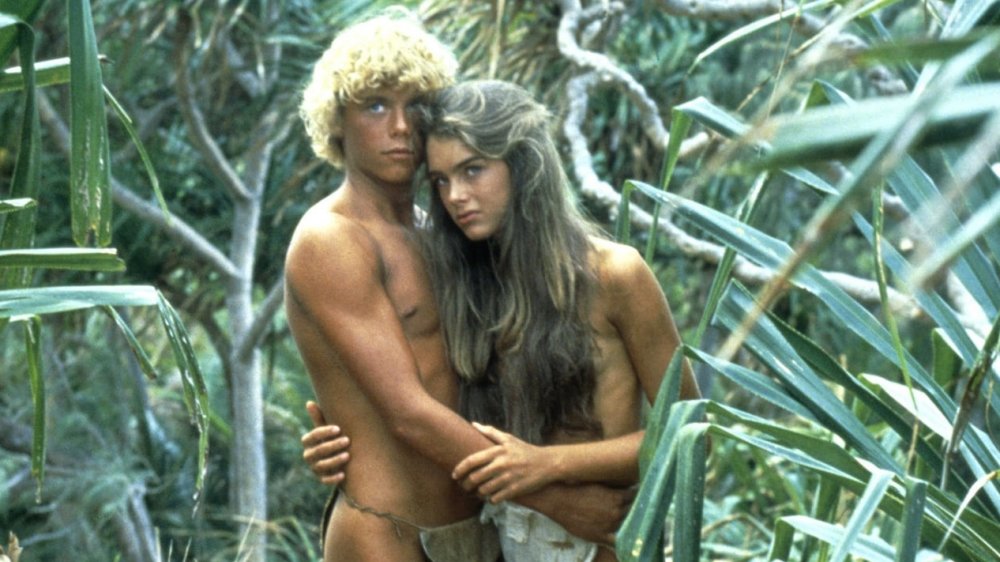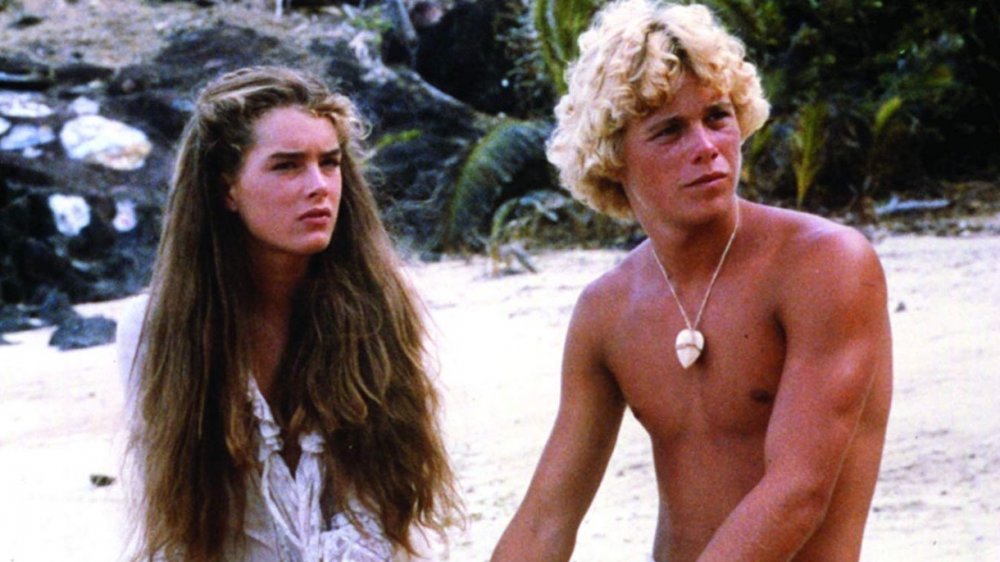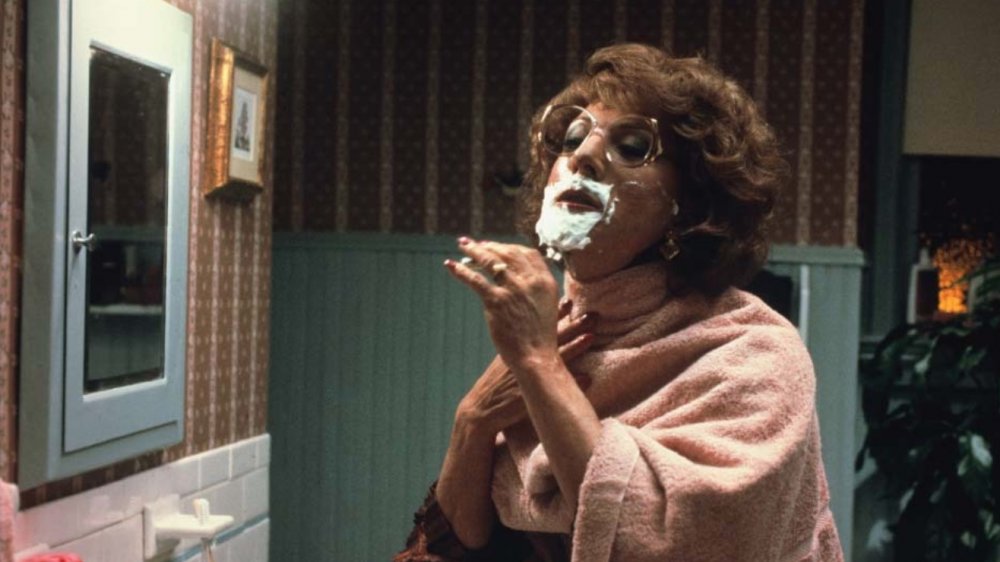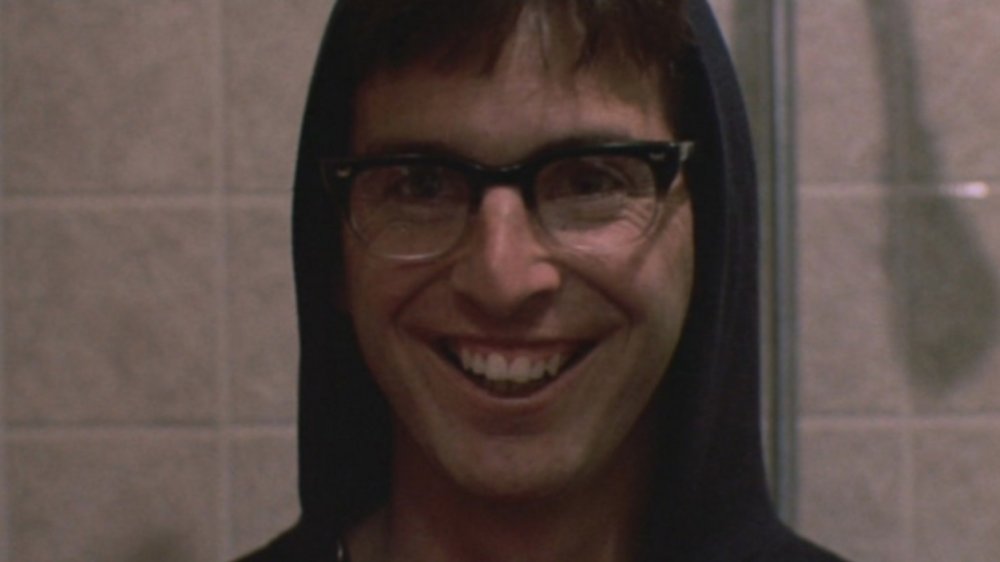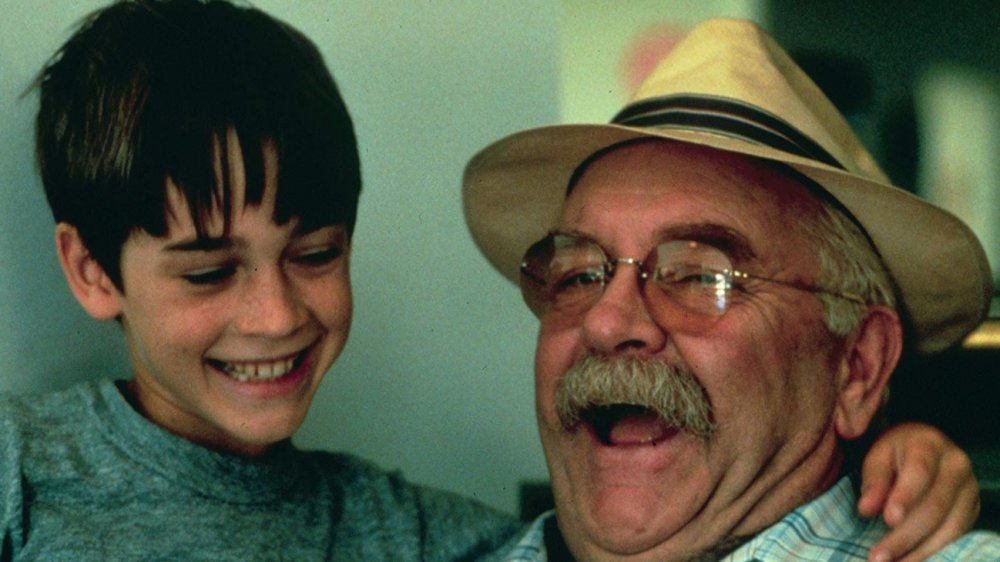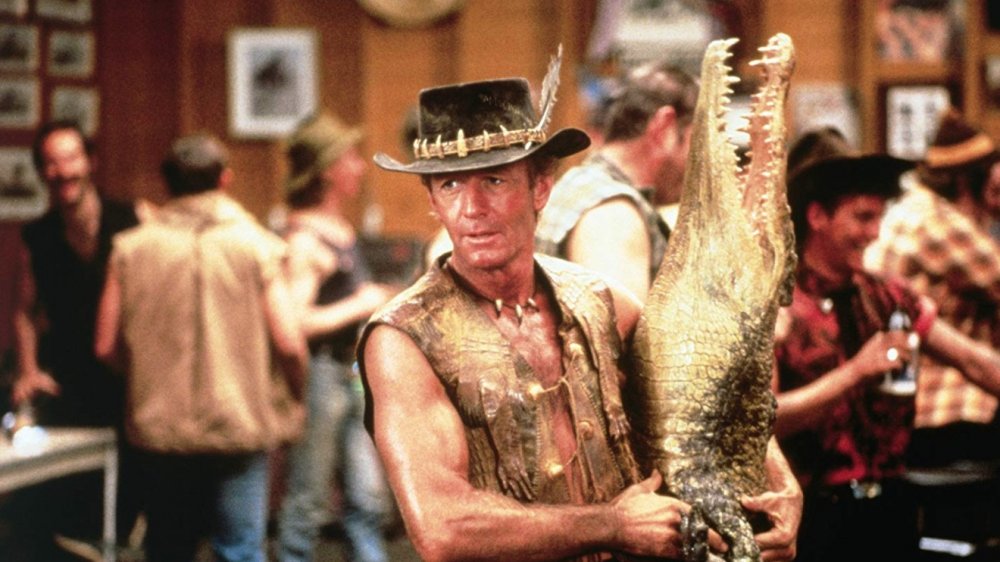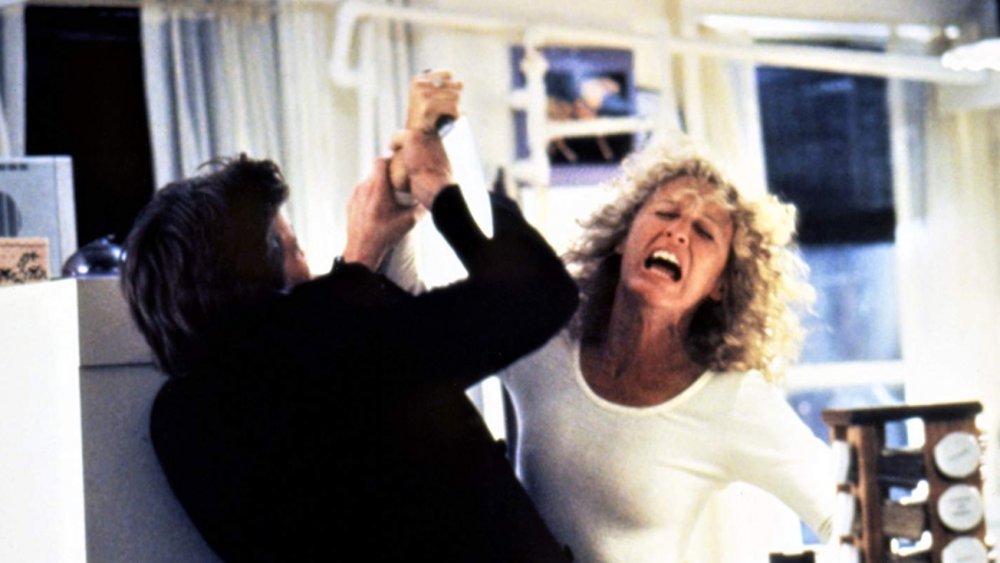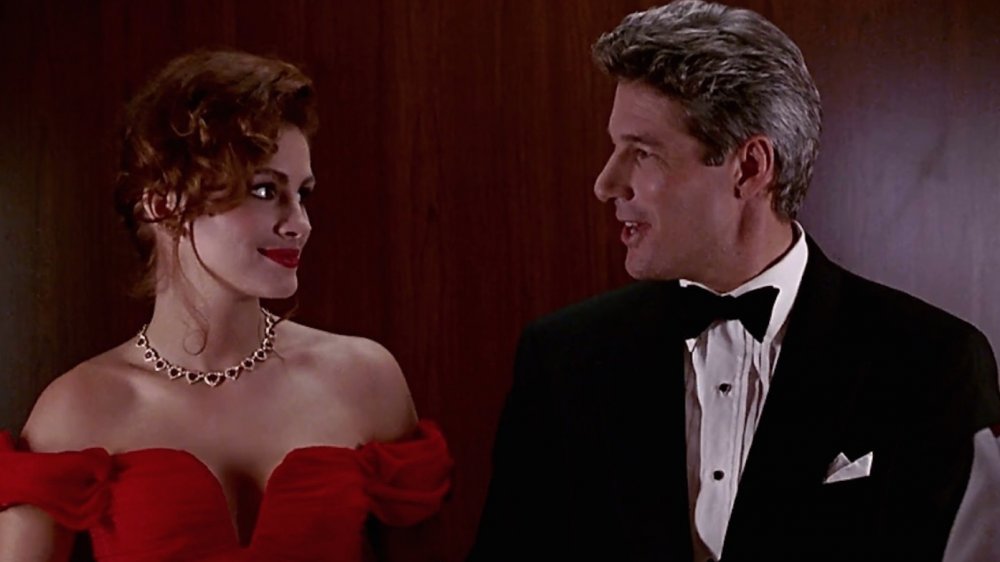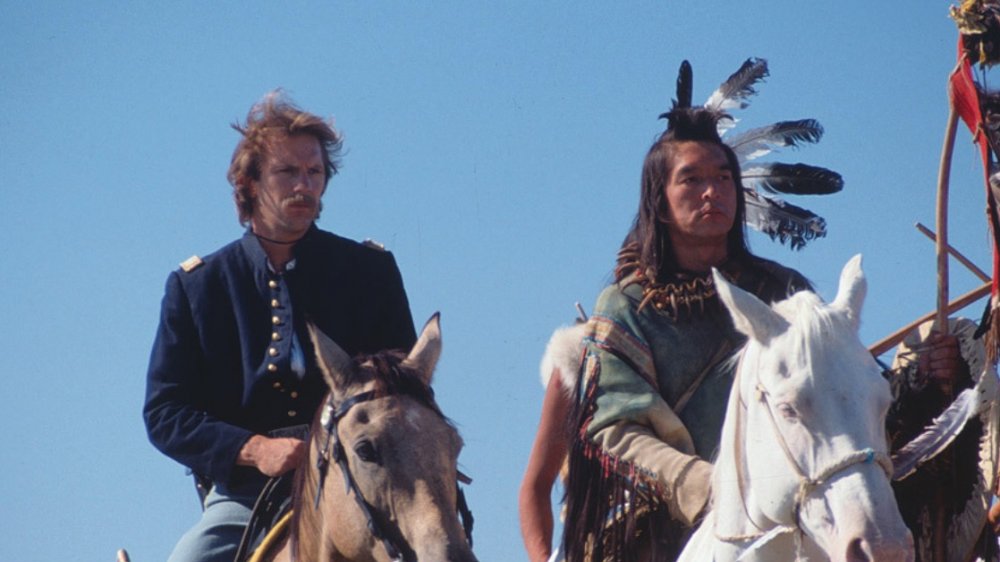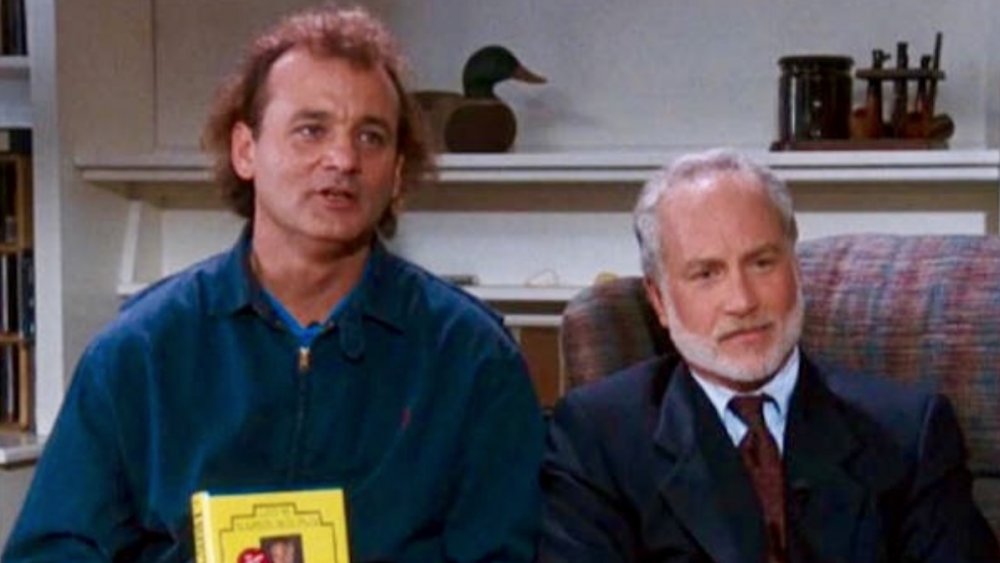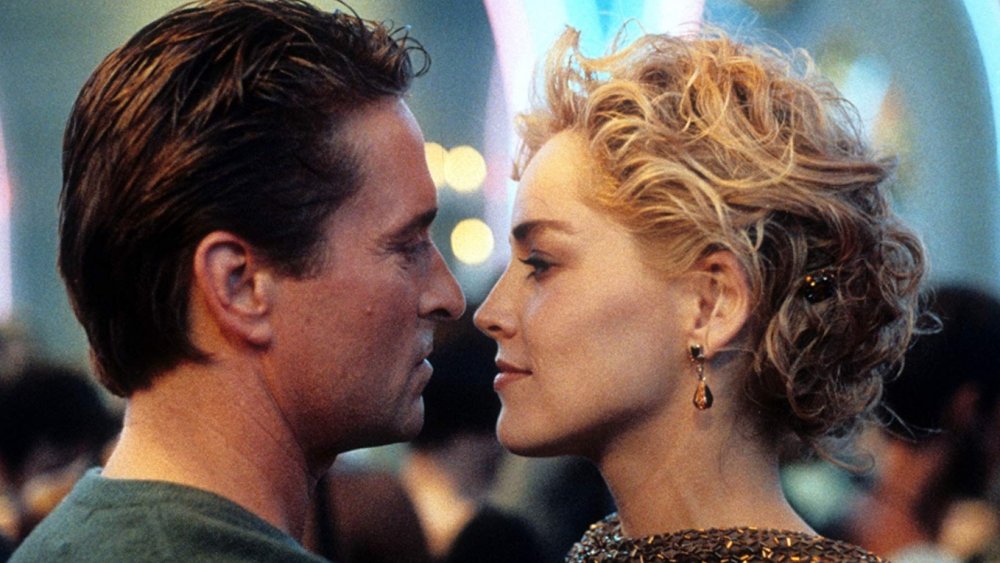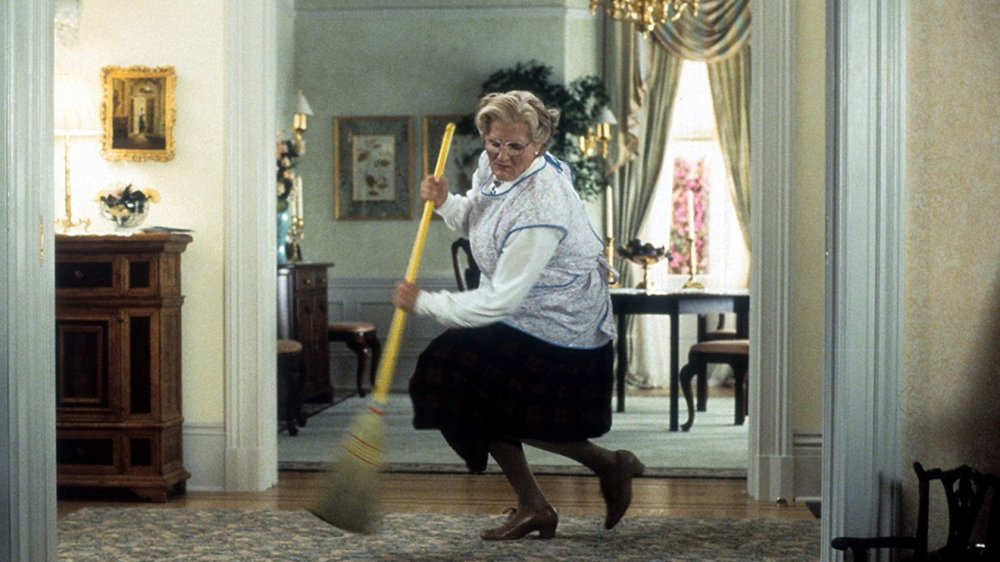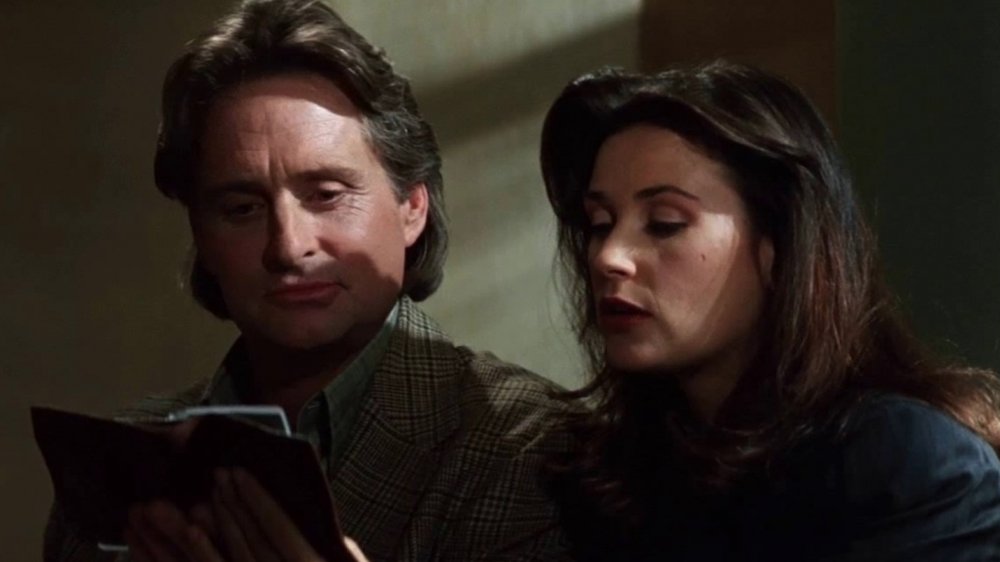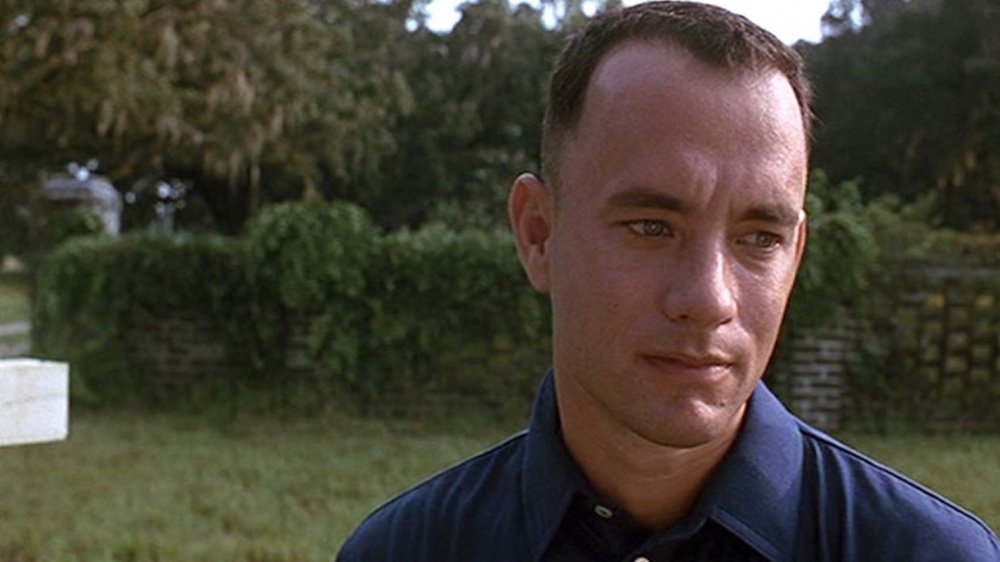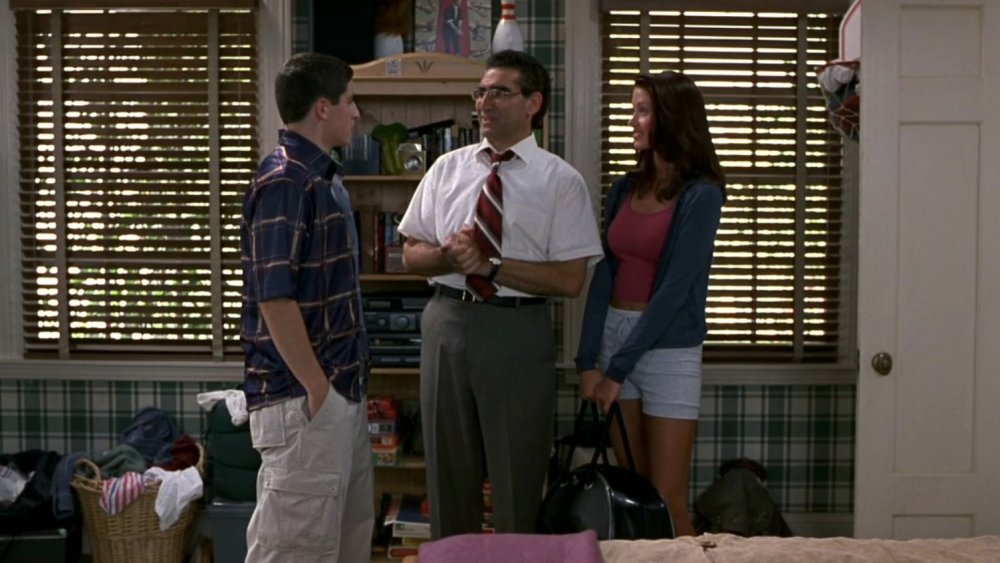Blockbusters Hollywood Would Never Make Today
Ever find yourself watching a movie from more than 25 years ago and wonder "How in the world could Hollywood have possibly gotten away with this?" We're not talking about movies from the Golden Age of Hollywood. Obviously cultural norms and standards were different several decades ago (we're still shocked people in the 1940s didn't live in a world that looked like a black-and-white film). But watching a movie from the 1980s and 1990s can be a perplexing experience — it's like looking at a world that seems very similar to our own, except that the characters and storylines are often so blatantly outdated and even offensive that it's completely cringe-inducing.
Yeah, the movies of the 1980s and 1990s were weird, and not just because most of the CG was so bad it looked like a bootleg Nintendo 64 game. Times have changed and so have we. But at the time, these problematic pics from the past made money — lots of it! Some of them are even still considered classics. Sure, these movies were blockbusters in their day, but there's no way Hollywood would make them today, and for good reason. From tacky jokes about mental health to teenage cousins copulating (seriously, gross), jaw-dropping racial and cultural stereotypes, and basically Michael Douglas' entire career during the era, you won't believe what these movies got away with. Ready to be amazed? Here are blockbusters Hollywood would never make today.
The Blue Lagoon still bothers us to this day
During Game of Thrones' final season, Arya Stark had a sex scene that blew up the interwebs. Despite actress Maisie Williams being 22 at the time, some fans worried that merely watching the scene with the cherubic-faced, childish-looking Williams amounted to a crime. Oh, how far we've come since The Blue Lagoon in 1980.
Based on the 1908 novel by Henry De Vere Stacpoole, The Blue Lagoon is about two cousins who are shipwrecked as children on a tropical island. As the years pass by without any hope of rescue, they build a simple life together, straight out of Swiss Family Robinson. Except this ain't a sweet, innocent Disney family flick — they eventually reach sexual maturity and start making babies. Literally. Ew, right? This story could have worked if it was treated delicately. But nope, The Blue Lagoon seems to celebrate its stars' pubescent salaciousness. If that wasn't icky enough, there's also the fact that star Brooke Shields was 14 years old when the movie was made! Fourteen! So are you breaking any laws if you watch this movie? Well, even if you are, plenty of people did. Despite its deserved 9% Tomatometer score — Roger Ebert called it "the worst movie of the year" and Shields won the first-ever Worst Actress Razzie Award — the $4.5 million production made $47 million, or $162 million adjusted for inflation. Dear moviegoers of 1980: what was wrong with you?
Dustin Hoffman in drag dominated the 1982 box office
By the early 1980s, Dustin Hoffman had become one of Hollywood's most respected actors and a top box draw after a decade spent playing a college graduate, a divorced dad, and even a 121-year old man. What roles were left to tackle? Playing a man playing a woman, of course!
In 1982's Tootsie, Hoffman plays Michael Dorsey, a down-on-his-luck actor who can't get work due to his demanding, difficult nature. Desperately in need of $8,000, Dorsey dons a wig, makeup, and dress to become "Dorothy" and gets a role on a soap opera. Tootsie earned a terrific 90% Tomatometer score, plus ten Academy Award nominations, including Best Picture, with Jessica Lange winning an Oscar for best supporting actress. Moviegoers loved it too, and Tootsie took home $177 million on a $21 million budget.
Tootsie is one of the greatest comedies of all time (literally, the American Film Institute ranked it #2), but this is still a movie whose biggest laughs come from the fact it's about a man dressing like a woman to get ahead in his career. We just can't see that flying today. Funnily enough, the film that's just ahead of Tootsie as the number one greatest comedy of all time is 1959's Some Like It Hot, so clearly men dressing up as women tickles the AFI's funny bone.
Revenge is a dish best served dorky
No movie characters deserve revenge more than dweebs, dorks, geeks, and nerds. They got it in 1984's Revenge of the Nerds, a standard college sex romp that flips the script by making the movie's main heroes the characters who have always been confined to one-note supporting parts. The film is set at Adams College, where a group of socially awkward outcasts and misfits band together to fight back against the football players who bully them. With a sense of humor that is lowbrow but surprisingly sly, Revenge of the Nerds managed a Fresh 70% Tomatometer rating. While Nerds only mustered a meek $1.5 million opening, the movie caught fire and showed huge legs, ultimately making $40 million, or $110 million in today's dollars.
Hooray for social progress, right? Not so fast, as the movie kind of makes the nerds into monsters and what's even worse, plays it for laughs. The movie features your typical gross-out sex humor we'd seen thousands of times before (and would see thousands of times later), but one key scene stands out. Near the end, a nerd has sex with a sorority girl under false pretenses because she thinks she's sleeping with her boyfriend (he's wearing the dude's Darth Vader mask). As if that isn't bad enough, she falls in love with her assaulter. This obviously wouldn't fly today, and even the Revenge of the Nerds filmmakers regret it.
Cocoon was the movie to dia-beat-us in 1985
By 1985 Ron Howard had transitioned from an actor in wholesome hits like The Andy Griffith Show, Happy Days, and American Graffiti to an A-list movie director. Following the box office success of Splash, Howard's next project was Cocoon, a comic fantasy film about a group of elderly people who encounter a swimming pool filled with large pods left behind by aliens that have the power to restore eternal youth. The film stars supporting character actors from decades past, including a pre-diabeetus Wilford Brimley, Don Ameche, Hume Cronyn, and Jessica Tandy, as well 1980s go-to comedian Steve Guttenberg.
In a decade defined by Ghostbusters, Indiana Jones, Back to the Future, and Eddie Murphy movies, a film about octogenarians hanging out with aliens doesn't scream blockbuster. But a blockbuster it was. Cocoon got a 77% Tomatometer rating from critics, while audiences turned out in droves, giving the film a $76 million gross, or $195 million today, making it the sixth highest-grossing film of 1985. There's nothing wrong with Cocoon, so why did it make the list? Simple. We have a really hard time believing a sci-fi comedy starring senior supporting actors from the past would be made today. Sure, there are still senior-driven comedies, like 2013's Last Vegas, but those movies tell pretty straightforward stories and star A-listers like Michael Douglas and Robert De Niro. Cocoon took a big risk that paid off in 1985, but we can't see Hollywood making that same gamble today.
It has been a while since "Crocodile"
"Crocodile" Dundee came out of nowhere in 1986, earning an 87% Tomatometer score, an Oscar nomination for Best Original Screenplay from the Academy Awards, and $174 million domestically and $328 million worldwide, making it the second highest-grossing film of 1986 behind Top Gun. Not bad for a movie starring a relatively unknown Australian comedian in his late 40s. In the film, Paul Hogan plays Michael J. "Crocodile" Dundee, an eccentric Australian crocodile hunter who is brought to New York City by an American reporter, where hilarity ensues (including the famous "you call that a knife?" scene). It's a charming, Capra-esque, "fish-out-of-water" comedy that caught critics and moviegoers by surprise, and managed to launch an unlikely franchise, including a well-received Super Bowl ad and the 2020 meta-comedy The Very Excellent Mr. Dundee, in which Paul Hogan plays himself.
Though the series immediately saw diminishing returns, all in all the original "Crocodile" Dundee is a pretty awesome little Aussie comedy. Perhaps we're being a bit too sensitive by including it on this list, but the movie does play the stereotypical "boy, those Australians sure are wacky!" card pretty heavily. In a movie industry dominated by cosmopolitan Aussies like Nicole Kidman, Hugh Jackman, Margot Robbie, and Chris Hemsworth (most of whom probably wouldn't survive one day in the outback), we can see the cliche, unsophisticated Aussie stereotype being a hard sell for movie studios, though we doubt most Australians would care.
Moviegoers felt a "Fatal Attraction" for this 1987 thriller
You know a movie strikes a nerve when its title becomes pop culture lingo. For example, Fatal Attraction is basically shorthand for the "overly attached girlfriend" meme from 2012, only much more psycho. Michael Douglas stars in the 1987 film, having recently ditched his "Harrison Ford-lite" persona from Romancing the Stone and Jewel of the Nile to become "America's Favorite Creep" in movies like Wall Street and Fatal Attraction. Douglas plays family man Dan who has a one-night stand with Alex, played by Glenn Close. Or so he thinks. Their simple affair spirals out of control when Alex develops a... wait for it... fatal attraction for Dan, obsessively trying to continue the relationship and destroy his suburban, nuclear family unit to the point of stalking, kidnapping, and even boiling his daughter's pet rabbit! Now that's just wrong.
Much like a lurid paperback, Fatal Attraction is hard to put down. Critics gave it a 76% Tomatometer score and Academy voters nominated it for six Oscars, including Best Picture. Its box office was even better, earning $156 million stateside and $320 million worldwide worldwide to become 1987's second-biggest domestic hit (just behind the far less prurient Three Man and a Baby). But let's get real here — the movie is basically about a psychopathic stage-five clinger who torments a dad who was just looking for a good time. There's no way this movie would get made today, as rabbits nationwide breathe a sigh of relief.
"Pretty Woman" was the OG hooker with a heart of gold
In 1990, Julia Roberts hadn't hit mega-stardom yet but had turned heads in Mystic Pizza and Steel Magnolias. Pretty Woman changed all that in an instant. In the film, Roberts plays a prostitute who is hired by a wealthy businessman played by Richard Gere to be his escort for high-end social events. Hilarity ensues and lessons are learned as Gere, who earned his money legally but in a morally dubious profession (unlike the illegal prostitution, the movie's cheap, on-the-nose attempt at social commentary) eventually falls in love with Roberts.
Pretty Woman only managed a so-so 62% Tomatometer score, but moviegoers fell in love with it. The movie earned $178 million domestic and $463 million worldwide on an $11 million budget, making it the fourth highest-grossing movie of the year, and delivering an insane return on investment that blasted Roberts into the A-list. Honestly, the only actor who had a better star-making turn that year was Macaulay Culkin in Home Alone. Being the massive success it was, Pretty Woman is the most blatant example of the "hooker with a heart of gold" trope, and is basically a dated yuppie sex fantasy that turns 50 Shades of Gray into a cutesy rom-com that's safe for a Valentine's Day date night. Despite earning millions, it'd have a tough time getting made today. However, thanks to the pull of nostalgia, the musical version has been a big hit on Broadway and beyond.
"Dances with Wolves" wouldn't have a dog's chance today
Dances with Wolves is best remembered for being one of the biggest Academy Awards travesties ever for beating Martin Scorsese's mob masterpiece Goodfellas. To be fair, Kevin Costner's epic directorial debut was a really big deal in 1990. It was nominated for 12 Oscars and won seven, earned an impressive 83% Tomatometer score, and made $184 million domestically and $424 million worldwide, becoming the third highest-grossing domestic release of 1990. And all on a $22 million budget, an impressively modest sum given the movie's sweeping, epic scale.
The film has received some positive reappraisal in the three decades since its release. However one feels about the movie's quality, though, there's no doubting its "white savior" storyline is seriously outdated. In the film, Costner plays Civil War soldier Lt. John Dunbar, who befriends a band of Sioux Indians, eventually abandoning his culture for theirs. Yes, we've seen this story told one thousand times before and since, sometimes even with giant blue aliens (*cough* Avatar *cough*). The "noble savage narrative" that turns native people into free-spirited hippies is not only ahistorical, it has been done to death. We hope Hollywood wouldn't make Dances with Wolves today.
Playing mental phobias for punchlines wouldn't play today today
So you think that Hollywood would have never made a comedy about mental illness? What About Bob? In the 1991 film, Bill Murray plays Bob Wiley, a neurotic New Yorker struggling with a host of phobias who is pawned off by his unnerved therapist to famous psychoanalyst Dr. Leo Marvin, played by Richard Dreyfuss. When Dr. Marvin and his family venture to New Hampshire for a monthlong vacation, Bob follows them, a scenario that sounds like the plot to a million different horror movies, but in this movie is played for laughs. Along the way Dr. Marvin, who is also preparing for aa major interview on Good Morning America, goes steadily insane thanks to Bob's escalating peskiness.
Critics dug it, giving What About Bob? an 84% Tomatometer score, while moviegoers shelled out $63 million at the box office, or $137 million adjusted for inflation. But let's be honest here — behind all the laughs is a movie that makes a man's mental health challenges (including obsessive compulsive disorder, panic disorder, agoraphobia, hypochondria, etc.) the butt of a joke. While the movie isn't mean-spirited about Bob's issues per se, and in fact is much more critical of Dr. Marvin's self-absorbed narcissism, playing real-life phobias for punchlines wouldn't fly today. You might say Hollywood is taking "baby steps" to being more open-minded about mental illness.
The movie that made Stone a star wouldn't get made today
Michael Douglas again! In 1992, Mikey D was riding high after reshaping his screen persona into a repugnant jerk, scoring a big hit as an adulterous husband in Fatal Attraction, and Oscar gold as money-grubbing stockbroker Gordon Gekko in Wall Street. In 1992 he made one of the most memorable, and controversial, films of his career — Basic Instinct. Douglas plays Nick Curran, a violent, sex-crazed detective who's investigating a brutal murder involving an ice pick and a manipulative, seductive novelist, Catherine Tramell, played by Sharon Stone. The movie made waves in Hollywood before a single frame was shot, earning screenwriter Joe Eszterhas a $3 million payday, then the largest sum ever paid for a script not commissioned by a studio.
Despite its rotten 53% Tomatometer score, critics couldn't kill Basic Instinct, as it made $117 domestically and $352 million worldwide, becoming the ninth biggest hit of 1992. While there is definitely still an audience for this sort of lurid violence, Basic Instinct was super pricey for its B-movie sex thriller storyline, costing $49 million to produce, or just under $100 million today. Budgets like that are only justified today if there's a pre-existing IP, but Basic Instinct sprung solely from Eszterhas' salacious imagination. There's also the fact Stone plays a sadistic seductress who uses sex to entrap men, a trope sure to inspire backlash in 2020.
We seriously doubt "Mrs. Doubtfire" would get made today
Say you're a divorced dad who only gets to spend a limited amount of time with your kids. What do you do? If you're Robin Williams, you cross-dress as a Scottish octogenarian, of course. So it's not quite Marriage Story, but it works. In Mrs. Doubtfire, Williams plays an out-of-work San Francisco actor who loses custody of his three children to his ex-wife, played by Sally Field, so he does what any reasonable dad would do — he disguises himself as a matronly nanny named Mrs. Doubtfire. You know, like you do.
The memory of this beloved movie is strong in the minds of millennials who grew up watching it, but it's truly bizarre when you think about it. Nevertheless, Mrs. Doubtfire earned an impressive 72% Tomatometer score, and an even more impressive $219 domestic and $441 million worldwide haul on a $25 million budget, making it the second-biggest hit of 1993 behind Jurassic flippin' Park. A round of applause for Robin Williams, whose supernova-level star power elevated this super sketchy, saccharine scenario into one of the biggest comedy hits of the 1990s. Seriously, imagine anybody else as Mrs. Doubtfire and the movie falls apart. But let's be honest here, those kids are going to need a lot of therapy, which an unemployed actor working as a nanny probably couldn't afford. Sure we love Mrs. Doubtfire, but we seriously doubt it would get made today.
Douglas learns you don't mess with Demi
Michael Douglas... again. Based on the novel by Michael Crichton, Disclosure finds Douglas playing Tom Sanders, an executive at a software development firm whose expected promotion is taken by his former lover, Meredith Johnson, played by Demi Moore. His new boss Meredith invites him up to her office after hours — only it's not to burn the midnight oil, if you catch our drift. Shockingly, Sanders rejects her, but the next day finds his life and career in jeopardy when she accuses him of sexual harassment. Critics were unimpressed, giving the mediocre melodrama a 58% Tomatometer score, though audiences were more kind. Coming just one year after Crichton's biggest blockbuster, Jurassic Park, Disclosure earned $83 million domestically and $214 worldwide on a $55 million budget. You have to give Douglas credit — dude is a box office draw in these kind of movies. But in this era we doubt any movie studio would have much of a desire to make a movie about a handsome, successful man being the victim of sexual harassment. Yes, sexual harassment is wrong no matter who it happens to, we just have a hard time believing a movie studio would take the risk of spending major money on subject matter this socially controversial.
Movie studios would run from "Forrest Gump" today
You know the game where you describe a movie badly? Forrest Gump would be: a man with special needs somehow finds himself involved in the most consequential events of the 20th century before becoming a shrimp boat billionaire and marrying his hippie girlfriend who has AIDS. Describing Forrest Gump badly gives you an idea of how it would be problematic today (and if you think that sounds bad, you should hear about its proposed sequel). While Forrest Gump surprisingly only managed a 70% Tomatometer score, Oscar voters were much more generous, as it was nominated for 13 Academy Awards and won six, including Best Picture. Audiences loved it too. On a $55 million budget, it earned $330 million domestically and $678 million worldwide, becoming 1994's biggest hit stateside and the second biggest worldwide.
Despite being super sentimental and borderline beyond belief, Forrest Gump still warrants admiration. But let's be real, Gump's story is problematic. The film has become the standard bearer for a sub-genre of Oscar-bait dramas in which actors play mentally handicapped people in order to win awards. It's so common, Tropic Thunder even made a now-infamous joke about it. Forrest Gump is a modern American fable, and should be viewed as such. But as an accurate or sensitive depiction of people with special needs, the film is seriously lacking. While Forrest Gump ran all over the box office and awards circuit, we doubt it would be made today.
"American Pie" is a teen sex comedy with a slice of cringe
American Pie only earned a so-so 61% Tomatometer score from stuffy old critics, but what do they know? For the moviegoers who really mattered, an entire generation of millennials, this timeless tale of four teenage dudes trying to get laid made $102 million domestically and $235 million worldwide on an $11 million budget. It also launched a franchise with enough sequels and straight-to-video spinoffs to challenge The Land Before Time for the title of "movie series with the most needless sequels." Pretty impressive for a movie that basically just revived the raunchy sex romps of the 1980s, only this time moving from the frat house to somebody's parent's house by replacing college students with teenagers.
We're not so naive as to think high school is just a G-rated family flick you'd find on Disney+, but let's be honest, a movie about underage high schoolers having sex is a bit, well, creepy. We can excuse that part, as it basically describes a bazillion movies before and since. However, there's one scene in particular that's really problematic. You know the one. It's the part where Shannon Elizabeth's foreign exchange student Nadia strips in Jim's bedroom while unknowingly being recorded via webcam and broadcast over the internet. In a world where people's privacy is constantly being violated by pervs hacking into the cloud, this type of "comedy" just wouldn't fly. Also, we seriously doubt Jason Biggs got that cherry pie's consent.
